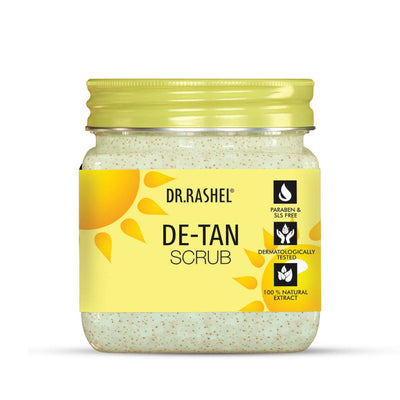
Table of Contents
- What is a Face Wash?
- What is a Face Cleanser?
- Key Difference in Face Wash & Face Cleanser
- Which One is Best for Me?
- How to Include Face Wash and Cleansers in Daily Routine?
- How to Use Face Wash and Cleanser?
- To sum it up
- FAQ's
Staring at the long aisle of skincare products, you think “Does it have to be this complicated?”
Washing your face with a face wash or a face cleanser can be a tough call to make. The very first step in any skincare routine and you're stuck deciding which one is best for you.
No worries folks, read on to get to know what exactly is the difference between face wash & cleanser and which you should pick.
What is a Face wash?
Initially used bar soaps evolved into face washes formulated to better clean your face without causing any harshness to your skin. Face wash is a gel-like and foamy liquid that cleans the dirt, oil, sweat and other pollutants from deep within your skin.
What is a Face Cleanser?
Face cleansers are gentler on your skin than any face wash. They’re available in a variety of forms based on skin needs, cleansers also help in clearing out dirt, makeup, sweat and other impurities in a mild and hydrating way.
Key Difference in Face Wash & Face Cleanser
| Factors |
Face Wash |
Face Cleanser |
|
Foaming |
A face wash is used with water and lathers into a foam |
A cleanser mildly cleans without creating much foam. |
|
Skin Suitability |
Best suited for oily, acne prone & combination skin type. |
Best suited for dry, combination & sensitive skin type. |
|
Cleansing |
Removes deep-seated impurities without being harsh. |
Clean your skin in a more hydrating and soothing manner. |
|
Ideal For |
Cleaning up buildup from the day without stripping the skin. |
Removing makeup or SPF & thoroughly cleaning your face. |
|
Variety |
Face wash comes in gel, foam and milky formations. |
Face cleanser comes in gel, cream and oil formations. |
|
Ingredients |
Salicylic acid and Tea tree extracts that fight oily and acne. |
Glycerin and Ceramides that keep your skin soft & nourished. |
|
Who Should Use |
Those who stay out for long hours. |
Those who mostly stay indoors. |
Which One is Best for Me?
This is where we all lowkey lose it. The way to solve this question is to understand your skin concerns and needs. Face washes and Face cleansers have different levels of cleansing for different skin concerns.
Face wash is the right pick for you if you tend to sweat more and produce excess oil on your face. Ingredients like charcoal or salicylic acid in a face wash remove excess oil and dirt without drying your skin. Face wash is also perfect to use for a deep cleanse that will unclog your pores and refresh your skin after a day full of being exposed to the city’s pollution.
Face cleansers are ideal for sensitive and dry skin because they are hydrating and soothing to the skin. They contain glycerin and ceramides that lock in moisture and prevent dehydration. Face cleansers are best to take off heavy makeup and are formulated to be gentle and not make your face feel dry after a wash.
How to Include Face Wash and Cleansers in Daily Routine?
Both face wash and face cleanser can be incorporated into your skincare routine. It is ideal that you start off with a face wash in the morning that will get rid of overnight buildup of oil and give your skin a fresh start.
Depending upon the environmental conditions or the activity you're carrying out, you can use a cleanser to give the surface of your skin a gentle cleanse.
If you're someone who uses makeup everyday or just likes to experiment new glam looks and need just enough cleaning to take off the makeup without stripping the skin off, then consider face cleansers your BFF.
Double cleanse is quite trendy among skincare enthusiasts. Double cleansing is a two-step cleansing routine that ensures your skin is free of all impurities. When double cleansing, it is important you use products in the right order. For the first step, you should use an oil-cleanser that is gentle and will dissolve excess oil, makeup and other pollutants. After you have used a cleanser it's time to use a foaming face wash to remove remaining dirt or oil. With the first face cleanser you said goodbye to all impurities from the surface of your skin allowing the face wash to reach deeper into your skin to completely clean out your pores.
How to Use Face Wash and Cleanser?
The steps to using a face wash and face cleanser are pretty similar if you ask me.
- Step 1: Start with washing your hands clean before you touch your face.
- Step 2: Second, wet your face with water if you are using a face wash or keep your face dry if using a face cleanser.
- Step 3: Take some amount of the product on your fingertips and start massaging it in circular motions on your face. Do this for about 1-2 minutes to ensure your face is thoroughly cleaned.
- Step 4: After you are done, rinse it off with lukewarm water and pat your skin dry.
- Step 5: Make sure to follow your cleansing process with a nourishing moisturiser.
Final Note
Face wash focuses on providing a deeper clean while face cleanser aims at providing a gentle cleanse and keeping the skin hydrated. In the end, they both help clean your face, though the extra benefits they provide depend on your skin's concerns. This blog has helped you understand the difference between face wash and face cleanser and how they are beneficial for different skin types and concerns.
So now you have an idea of which one to choose the next time you go skincare shopping.
FAQ's: Facewash Vs Face Cleanser
Which is better: face wash or cleanser?
It depends on whether you have oily or dry skin and what level of cleaning you want. Face wash is for oily/acne-prone skin and to deeply clean your pores. Whereas face cleanser is for dry and sensitive skin and to clean impurities from the surface of your skin.
Do you use cleanser as a face wash?
Cleansers can be used to mildly cleanse your skin without stripping the moisture off but they do not lather or foam up like any face wash.
Is it better to wash your face with water or cleanser?
Simply washing your face with water is a thing of the stone age era. In these times, with so much environmental pollution, it is better we use a cleanser that addresses our skin's needs and keeps our skin rejuvenated.
Can I skip face wash and only use cleanser?
You don't necessarily need to double cleanse your skin. Skipping a face wash and using a cleanser that suits you instead is possible.
Which is first, cleanser or face wash?
The process of double cleansing is started with a face cleanser to clean surface pollutants followed by a face wash to clean deeper in your skin.
Is face wash and cleanser the same?
Although they both serve the need to clean off your skin, they both are different in their formulations and benefits they provide to specific skin types and concerns.
Can I use both face wash and face cleanser?
Yes, you can use both - many people cleanse with a gentle cleanser first to remove dirt or makeup, then follow with a face wash for a deeper clean. This is often called double cleansing.
Is a cleanser better for sensitive skin than face wash?
Cleansers are usually gentler, formulated with hydrating and soothing ingredients. They cleanse without stripping natural oils, making them a safer choice for sensitive or easily irritated skin.
Can I use a cleanser if I have acne-prone skin?
Yes, many cleansers are designed for acne-prone skin with ingredients like salicylic acid, tea tree, or niacinamide. They remove impurities while being gentle enough not to aggravate breakouts.
Which is gentler on the skin: cleanser or face wash?
Cleansers are typically gentler as they’re designed to remove dirt and impurities without harsh foaming agents. Face washes, especially foaming ones, can feel stronger but may sometimes strip natural oils.
Should I use face wash or cleanser in the morning?
In the morning, a cleanser is usually enough to remove overnight oil and sweat without over-drying the skin. If you have very oily skin, a light face wash can also be used.
Should I use cleanser or face wash at night?
At night, a face wash works better if you’ve been exposed to dirt, pollution, or heavy sunscreen. Pair it with a cleanser if you wear makeup, so your skin is fully clean before bed.
Can I use a cleanser before face wash?
Yes, this is common in double cleansing. The cleanser breaks down makeup, oil, and sunscreen, while the face wash gives a thorough cleanse to leave skin fresh and balanced.
Which is better for removing sunscreen: cleanser or face wash?
A cleanser, especially an oil-based one, is better at breaking down sunscreen. However, a face wash can be used afterward to ensure all residue is gone.
Which is better for removing makeup: cleanser or face wash?
Cleansers are more effective for removing makeup since they’re designed to dissolve oils, foundation, and waterproof products. A face wash alone may not fully clean heavy or long-wear makeup.
How many times a day should I use face wash vs cleanser?
Both should generally be used twice daily - morning and night. If your skin feels dry, you can use a cleanser in the morning and a face wash only at night for balance.
Should I exfoliate after cleanser or face wash?
Exfoliation should come after cleansing with either product, as clean skin allows exfoliants to work more effectively. Always follow with moisturizer to protect the skin barrier.
Are gel cleansers different from foaming face washes?
Yes. Gel cleansers are usually lightweight, hydrating, and gentle on the skin, while foaming face washes create lather that deeply cleans pores and controls oil.
Do foaming cleansers count as face washes?
Yes, foaming cleansers are a type of face wash. They’re designed to lather and deeply clean the skin, making them ideal for oily or acne-prone skin types.





.png)
.png)


